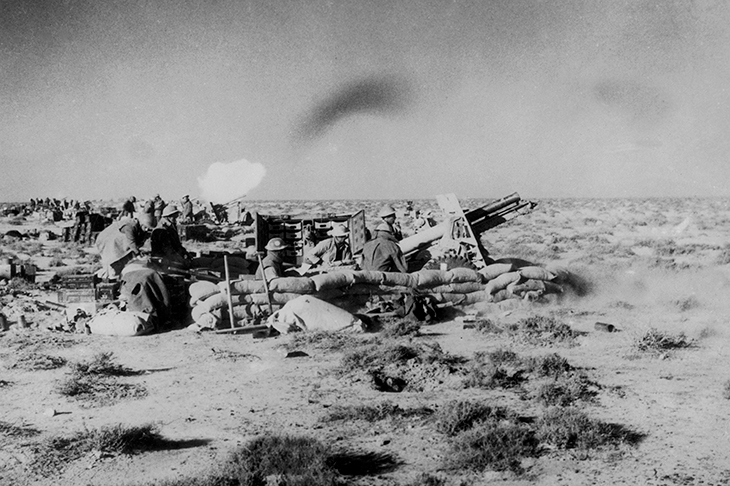‘Old men forget; yet all shall be forgot,/ But he’ll remember, with advantages,/ What feats he did that day.’ Peter Hart quotes the St Crispin’s Day speech aptly, for as an oral historian at the Imperial War Museum, he’s done his bit over the years to record memories. By the 1980s the IWM’s sound archive had amassed an impressive collection of interviews with veterans of the first world war, and so began on those of the second. At Close Range weaves the recollections of 50 veterans (an unusually high number for a single unit) from what, as Hart puts it, some might consider a relatively obscure regiment, into a continuous narrative of five years’ campaigning — ‘from the traumatic excitement of action to the banalities of life as a soldier at war’.
That was the 107th Regiment, Royal Horse Artillery (South Nottinghamshire Hussars), former Yeomanry cavalry who’d been converted to artillery in 1922. As territorials, ‘weekend soldiers’, the yeomen-gunners were local men who knew each other and their families, but with the passing of Leslie Hore-Belisha’s (universal) Military Training Act in April 1939, they were suddenly joined, says Hart, by men who knew that if they didn’t become territorials they’d ultimately be conscripted and probably end up in the infantry. Coming from families who’d perhaps lost men in the Sherwood Foresters in profligate Great War offensives, who could blame them?
The South Notts Hussars were embodied (the equivalent of ‘mobilised’ in the regular army) in September 1939 and sent the following year with the 1st Cavalry Division, who were still mounted, to Palestine. Equipped with the first world war 18-pounder, modified with pneumatic tyres and hauled by mechanical- rather than horse-power, but facing no German threat, they spent the Phoney War in relative comfort. But when Mussolini threw in with Hitler in June 1940 they moved to the Western Desert and converted to the new 25-pounder howitzer. Now things got serious.
Hart is at pains to stress that what matters in the book is ‘the men who fought the battles: not the grand strategy, the operational theories, the tactical minutiae’. In fact, for those with an interest in tactical minutiae, the book is a treasure trove. We learn, for example, from Bombardier (Corporal) Ray Ellis, evidently a keen artillerist, that besides being far more accurate (‘you could almost drop two shells in the same hole’), the 25-pounder was pleasingly more lethal:
When the shell landed the fragmentation was very tiny. A big shell may shatter into no more than 20 splinters which could hit or miss —but the 25-pounder fragmented into tiny little pieces, which never got much above knee high as it spread. It was a great killer and — as an artilleryman looking for something that will kill — it was a far more efficient projectile.
But disaster befell the regiment at Tobruk in 1942 when the Germans came on the scene. The besieged garrison was ordered to fight to the last round. The accounts of casualties overwhelming the medical resources are harrowing in the extreme. What remained of the regiment was able to break out just before the fortress fell, to be almost annihilated a month later in a rearguard action covering the withdrawal of Eighth Army to the Egyptian border.
The remnants were cobbled together as a single sub-unit and incorporated in the 7th Medium Regiment RA. One of the sergeants recalled:
The battery was formed out of a lot of rag-tags: cooks, office clerks, quartermaster stores blokes, quite a few had prison service for desertion! The number of Nottingham people was probably about 10 per cent. All sorts of people were being flung together to try and make this battery with a bunch of new officers.
As a medium rather than a field battery, they were re-equipped with the brand new 5.5” calibre gun, which could hurl four times the 25-pounder’s weight of shell nearly ten miles. Their war would now be at longer range and more ‘industrial’, but, as a high priority for German counter-battery fire, just as dangerous. El Alamein, Tunis and Sicily followed, before they returned to England to be reconstituted in regimental strength to take part in the Normandy landings, and then on to the Rhine.
Besides death, there is much life in these pages, though even the humorous interludes can be tinged with pathos. An officer went to a café in liberated France in the hope of finding Giselle, the owner’s daughter, more receptive than in 1940:
I said ‘Would you like to come down to Lille for the evening?’ ‘Yes.’ We got to this hotel in Lille, not a very expensive hotel, had a meal and went to bed.
Waking next morning, he found that Giselle ‘had her hair shaved off and her hairpiece was lying by the side of the bed! She was in tears that I’d found out.’
The regiment fired their last salvo on 24 April 1945, just a fortnight before the surrender; but Hart goes on to record the experiences of occupation, the frustration of waiting to go home, and then the difficulties — social, mental and economic — of discharge. Some of it makes for uncomfortable reading.
Memory can play false, of course, but these recollections, admirably curated, have authenticity.






Comments